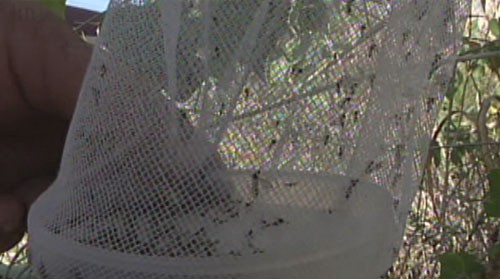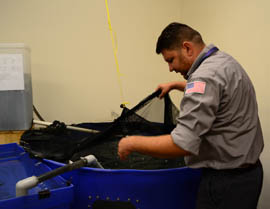Cronkite News has moved to a new home at cronkitenews.azpbs.org. Use this site to search archives from 2011 to May 2015. You can search the new site for current stories.
County hands out fish to help fight spread of mosquito-borne diseases
PHOENIX – One front in Maricopa County’s battle against mosquito-borne diseases begins in this tank filled with thousands of tiny fish.
Soon they will be dining on mosquito larvae in green pools, backyard ponds or fountains around the Valley and in the process helping curb the West Nile virus.
The Vector Control Division within the Maricopa County Environmental Services Department has handed out gambusia, a 1- to 2-inch-long fish native to the Gulf of Mexico, for more than 20 years. But more residents are picking up the fish these days due to West Nile concerns, said Johnny Diloné, a spokesman for the department.
Just one female gambusia can eat several hundred mosquito larvae in a day, and 15 can clean a pool that’s breeding mosquitoes, said David Guerrieri, field supervisor with the Vector Control Division.
“They’ll eat organic material, they’ll eat algae, they’ll eat themselves if they have to,” he said. “They are not too picky.”
Guerrieri said about 300 people have come to the division’s offices to get fish so far in 2011, while about 700 came in 2010. Several official websites link to information on the program, and media attention and word of mouth generate interest, he said.
The division has 26 inspectors to deal with pools that have turned green with algae at abandoned and vacant properties or when owners can’t afford to clean pools or are physically unable to do so. Enlisting the help of residents by distributing mosquito-eating fish makes that task more manageable, Guerrieri said.
“It saves us time,” he said.
The inspectors use the fish as well, leaving 15-20 after treating a green pool with chemicals, Guerrieri said.
He called the use of gambusia an “effort to be green, to use the minimum of pesticides as possible.” The division urges residents who take the fish not to release them into waterways, where they could compete with native fish.
Maricopa County has had 28 cases of the West Nile virus in 2011, two of them fatal. Jeanene Fowler, a spokeswoman for the Maricopa County Department of Public Health, said there are likely cases that go unreported.










